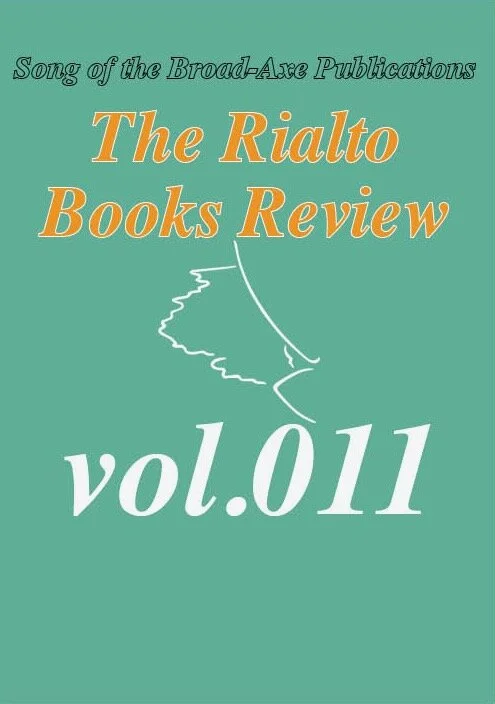The Rialto Books Review vol.011
The Rialto Books Review vol.011 is now available and can be purchased here.
The Rialto Books Review vol.011 includes the first installment of Alex Ranieri’s second novel, I Depart a Stranger, Veritas! Acts III, IV, and V by Russell Block and The Loft Apartment Pt. II by E.L. Hugh.
I Depart a Stranger
by Alex Ranieri
It was to be the last really fine day in Chicago that November; and the front room of the Art Institute’s Impressionist wing was full. Suffused with light in every corner, the room’s paintings reflected back onto eager eyes their delusion of summer; fashionable Parisians from a century ago lounged in bathing costumes on the banks of multicolored rivers, or sat singing at the piano, or dined al fresco, on balconies of restaurants long since shuttered. Only the grand centerpiece of the room, the Rainy Day, remained stolidly true to its name—forever in shade, its inhabitants lived on in a gray and black landscape, relieved only by one lady’s blush, her bright pearl earring.
The security guard, a short, wizened Black woman of seventy or beyond, still marched back and forth, only stopping to listen to two friends arguing over Rodin’s Balzac.
“It seems very cruel to me,” the young man said, “Look, he’s caught him at his most vulnerable point—it’s as though Rodin’s laughing at him.”
“No, no, no,” the girl responded, unreasonably incensed, “You’ve got it completely wrong. Just look at his jaw, the way it’s set. Rodin has perfectly captured his mixture of bravado and embarrassment.”
“That’s right,” emerged from the Sybil her verdict; for, beyond security guard, she was also, beyond doubt, the guardian of every secret of every work in this room, her favorite and most usual beat. She, too, became animated, and with expansive gestures continued, “Balzac, in fact, said this was his favorite portrait. It was completed near the end of his life—and what a life! He wrote hundreds of books, but died without a penny. Oh, yes, doubtless, he felt great embarrassment at this time of his life, though he had begun so sure of success.”
Veritas!
by Russell Block
ACT THREE
A part of the woods near a bog
Scene I
Father stands alone on stage. Enter Spencer.
Spencer. Alack, the woods tear a shirt new-made to tatters. There is no more mischief than in an errand when one sets off after one’s departed interest, or two love interests, indeed after self-interest, which I take it these damned woods despise. Whichever I find, they may well mark me manlier for this wayward commitment to my cause. Hold on, here is my cue, friend or foe, armed in opposition to something, surely. Well I had to have known the tricky face of my charade would rear its ugly head. Let this not be a father with unbidden news of pregnancy and the proposal in his arms one of wedding, me to her, or this to early grave.
Enter Hunter
Father. O, it is you, I thought I heard a bushy disturbance.
Hunter. You heard nothing of me, but thinking makes it so.
Spencer. O, unbelievable, the object of our games here looking the Orion approaches formed of the sprigs and leaf.
Father. Hey, tell me, under auspice less grim than now we have occasion for, I would enjoy the open air, the fresh snap of twigs, enjoy the long ordeal, if only —; but are we any closer to bagging my off-spring’s killer?
Hunter. I have told you time once, when we first started, now time again, we must subdue the snap of twigs and be perfect in our methods. Ask me not if we are closer when it is you who drives him farther off.
Father. I can try, I suppose, be disguised as the grouse, and put myself more over to our task. My motivations to see this through cannot be questioned.
Hunter. We must make do. Our intention on this excursion, and surely doomed, he, has much evolved to avoid men not trained in their craft so well as I in these woods. Soft, do you hear? A creature this way struggles, some games that plies arrogance near us, fool as it is. We will show it and cure this arrogance in salts, proportion enough for tonight’s stew. Now, for the practice, and to bring you up to snuff, we will startle this familiar. Move not.
Exit Hunter
The Loft Apartmet
Pt. II
by E.L. Hugh
Consistent with a checkered record in the flesh, and ever since his teenage years, rejections and dismissals were displayed in a template specific to iOS devices, or they were never received; and when he thinks about it, save for the blissful few hours he sat in study of the orange, he picked up his ALCATEL every time the restive urge arose. Now ready to leave the familiar behind, he abandons the phone to the bedding, opens the curtain, and closes the curtain again on the room, the empty rind, and the permanence of his efforts. At the last moment, he thinks better of it, imagining what emergencies might befall him in Detroit, checks to see that it is charged, and departs. Hungry for more substantial fare, the cold is braved, and the car starts.
Driving through Detroit creates a different sensation than the drive to Detroit. A preoccupation with potential typified his arrival, as a kind of daze does this excursion, which reveals how dissimilar life is to fruit, whose rind gives way categorically to the promise of its rind. Any such connections, of the kind he imagined his new environment would make plentiful, might make the inescapable accord with youth’s mysterious workings, through which agitation and influences were turned into an alluring, almost pulsating, gestalt; but no soul is known intimately for hundreds of miles from where Anthony sits. To be sure, when he decided to heed the invitation of the daemon, resolving to act, he also let the task of augury fall to reflection, to forethought not at all. A yellow light brings the SUV to a halt. Moreover, far from feeling satiated by his morning’s efforts, however intoxicating it was, those efforts passed like the hours after the ingestion of a drug, leaving him feeling dazed. An evident state of abiding disrepair observed through the windshield accords with the archipelagos of Anthony’s thought. With nothing else to occupy his sense, one car only moving through the remote intersection, remembrances of travel shows, details of biographies that inspired this sojourn, classes, and nothing more significant, at first, crosses thought. In all that passes is to be found the answer to the question of how the forces of life lead not elsewhere but here. Bored disinterest seems, to Anthony, a satisfactory enough explanation of their immanence. Each one hollow, disparate, parts unable to be made into a whole, they give way to more abiding scenes, which captivate; but each remains typified by their inability to cohere, however whole they are unto themselves. With the phone in his hand, he selfishly makes the roads far more dangerous than they already are and departs.





